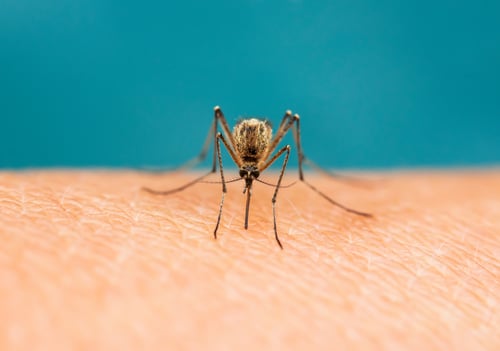After the frigid winters of Colorado, the warm relief of the summer sun breathes life into our mountains. With it brings the many pleasures of hiking, rafting, swimming and outdoor concerts, but also the most deadly creature in the world: the mosquito. Thanks to the large snowfall that we received this winter, we are experiencing a larger number of these pesky parasites than we would normally encounter. But what even is a mosquito? Why are they so dangerous? And why are they here?

Female Mosquito Probes Skin with Proboscis.
Let's start with the basics. Mosquito is a broad term that refers to the over 3500 species that live across the globe. Not all of these species bite or suck blood, and even fewer can carry disease, but those that can bite use a straw-like mouth called a proboscis to get their blood meal. Only female mosquitoes have a sharp enough proboscis to penetrate skin. They need this tasty snack to feed their eggs with iron-rich blood, making us prime targets for their feasts.
With the danger of mosquitoes, we might often think: “Why haven’t we eradicated the bug completely?” Mosquitoes are an essential part of our ecosystems by acting as an important food source for many species of bats, fish, birds, frogs and more. Without them, a major piece in the food chain would be lost. Mosquitoes are great pollinators too! Despite their reputation as blood-hungry nuisances, the majority of their diet is actually nectar, which they consume while pollinating wildflowers, vegetables and herbs. Regardless of these benefits, some believe the risks of these flies warrants large scale removals.
What makes these bugs so dangerous? Mosquitoes are what we call vectors, which means they can carry diseases between people and animals. Annually, mosquito-transmitted diseases cause over one-million deaths all over the world. Mosquitoes pass on diseases like Malaria, West Nile virus, Zika and many more by feeding on an infected host. Diseases multiply inside the mosquito before they are passed to the next human through the bug’s saliva. Colorado has seen cases of West Nile virus since 2002. The first case of 2023 has been reported in La Plata (Colorado Department of Public Health & Environment). The best way to avoid contracting these diseases is proper protection.
As long as we continue to go outside in the summer, we will be getting some serious face-to-face time with these bloodthirsty swarms. Here are four steps you can take to protect yourself:
- Limit the time you are outside during dusk and dawn. Mosquitoes are more active when the sun is down in order to hunt without the risk of dehydration.
- Wear long sleeves and pants when outside. The proboscis of the mosquito is usually unable to get through thicker fabrics
- Use an effective bug repellent.
DEET or N-diethyl-meta-toluamide. The most common ingredient is also often considered the most effective and long-lasting.
According to mosquito expert and neuroscientist, Dr. Emily J Dennis, DEET works because mosquitos taste with their legs. Mosquitoes dislike the smell and taste of DEET.
More natural products that are effective mosquito deterrents such as lemon-eucalyptus oil can also act as a long-lasting repellent.
- Drain standing water near your home, such as bird baths or stormwater drains, to limit areas where mosquitoes lay their eggs.
Whether we like it or not, mosquitoes will almost certainly always be in our lives. Understanding their roles as pollinators and important food sources for other creatures may bring some appreciation to the widely hated fly. However, recognizing the danger they can bring is also important to staying safe this summer.
Alice Dwyer is a summer naturalist at Walking Mountains Science Center. In the summer, she can be found hanging out by a lake telling people to wear blue to deter mosquitoes but in reality, she just thinks it brings out their eyes.










